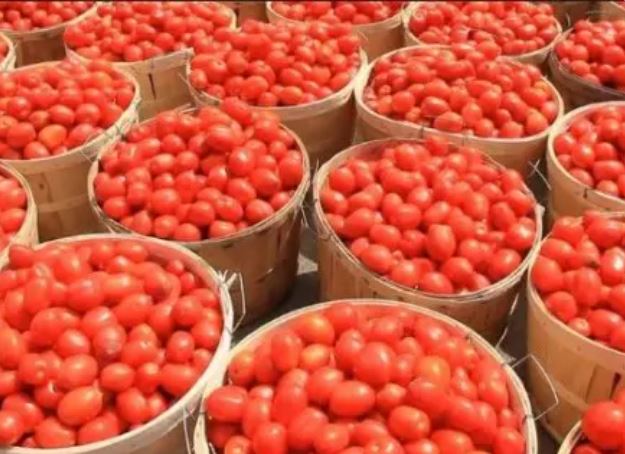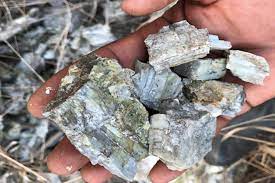
The Kano State chairman of Tomato Out Growers Association of Nigeria (TOGAN), Sani Danladi, has revealed that Tuta absoluta, one of the most devastating pests affecting tomato crops, is the main cause of the soaring prices of tomatoes across Nigeria.
Mr Danladi disclosed this in an interview with PREMIUM on Tuesday.
In recent weeks, households in Nigeria have had to dig deeper into their pockets to buy tomatoes, one of the most commonly consumed vegetables in the country, as prices have risen sharply due to shortage.
In the past month, prices have been on a steady rise as scarcity hit markets across the country.
Consumers have taken to social media to expresss worries and complain about the surging prices, comparing price rates in different regions of the country.
Speaking to PREMIUM TIMES on Tuesday morning, Mr Danladi revealed that Tuta absoluta reappeared in Kano, Katsina, Kaduna and Jigawa states in February.
Tuta absoluta is a species of moth in the family of Gelechiidae, which is also known by the name tomato leaf miner or ‘Tomato Ebola’.
It is well known as a serious pest of tomato crops in Europe and South America.
‘Tomato Ebola’
In 2016, there was a scarcity of tomatoes in major markets in the country due to the outbreak of Tuta Absoluta.
The incident reportedly caused about 80 per cent loss of tomato production in the country, leading to increase in the market price of the essential vegetable nationwide.
Although tomato appears to be a primary host of the pest, it has also been reported to attack eggplant and potato.
Since it was detected in Eastern Spain in 2006, it has invaded other parts of the world. Its outbreak was first reported in Niger and Senegal, before it attacked Nigeria’s tomatoes.
In Nigeria, it was first detected in Daura, Katsina State, in April 2015, in Kano State two months later and in Abeokuta, Ogun State, in September of the same year. It has since spread to all the other tomato-producing states in the country.
In 2016, the Kaduna State government declared a state of emergency in the state’s tomato sector due to the pest’s attack on farms.
According to the Federal Ministry of Agriculture and Rural Development (FMARD), six tomato-producing states, including Kano, Jigawa, Katsina, Gombe, Plateau, and FCT, were affected by the pest in 2017.
In 2020, tomato ebola resurfaced in Kano and ravaged many farms.
Resurgence
On Tuesday, Mr Danladi said “The primary cause of the high prices of tomatoes in the market is the tomato ebola.
“The tomato ebola started in February but because there are highly large production areas it didn’t affect almost all the areas but from April up till this period that is when all the tomatoes have finished.
“So, it’s only the riverine areas where they have so much plantation there that is why farmers are able to harvest some tomatoes from their farms. But now, almost all the tomatoes you see are coming from Pankshin Plateau and Ikara Kaduna State. These are the main places where you can get tomatoes now. That is why it is costly,” he said.
He noted that a kilo of tomato now sells for prices above N2000 from the farmers.
“Even at the farm a crate of 25kg cost N45,000 now from the farmer. Yes, that is why you see some farmers selling a bag for N60,000.
“The tomato Ebola is affecting Kano, Katsina Kaduna and Jigawa,” he added.
Secondly, he said there is the issue of high temperatures in terms of global warming.
“You know tomatoes are not friendly with high temperatures. So it is normally good when it’s cold weather between January, February and March maximum but when it is above that, you cannot grow tomatoes generally in the North.”
Mr Danladi urged the government to assist the farmers to help curb the disease while noting that “Tuta has come to stay.”
“Recently the federal government gave us some chemicals which we will be able to use to monitor our farms. We are calling on the federal government to assist our farmers again because this ebola has come to stay. We have started to experience this since 2015 up till now, and every year we experience it. It has come to stay. We can only manage it, learn how to adapt with it, how to have a bypass whereby we can be able to control it before it finishes all the farms,” he said.
As an association, he said, “We are sensitising our farmers to be very vigilant when they see it from their neighbours let them try to mobilise and inform the other people more efficiently the association then we will take it up and inform the relevant agencies to inform us on how to control it that is the only way we are doing to see that we survive.”
Market insight
A market survey conducted by this reporter in the Federal Capital Territory showed that the price of tomatoes had skyrocketed over a few months.
At the AMAC market in Lugbe, Abuja, a tomato dealer known as Bonanza Bonanza attributed the increase in prices to the planting season and the resurfacing of the pest in northern Nigeria.
He said a basket of tomatoes, which sold for between N30,000 and N45,000 earlier in the year, now sells for between N100,000 and N120,000.
“A basket of big tomatoes is now N100,000 – N120,0000 while the small basket is now sold for N40,000 -N50,000. No more N500 tomatoes, it’s from N800 and above now. Farmers are complaining that something is eating up and destroying their tomato crop on the farm,” he said.
At the Mile 12 International food market in Lagos, a basket of premium quality fresh tomatoes, which sold between N50,000 and N80,000 in April now costs between N140,000 and N150,000.
Muhammadu Sani, a tomato dealer in Ido Ekiti, told PREMIUM TIMES that the rise in tomato prices is seasonal.
“I have someone supplying me directly from Kano and Jigawa. But let me tell you, tomatoes do not do well during the rainy season. So the price increases during the season. I also hear that a pest is destroying tomato farms now and this is also one of the causes of tomato scarcity,” he said.
Agric minister speaks
Meanwhile, the Minister of Agriculture and Food Security, Abubakar Kyari, said the federal government is taking immediate action to combat this issue.
Mr Kyari disclosed this in a statement posted via his X handle on Monday.
“A significant number of our tomato farms have been affected by a severe infestation known as Tomato Ebola or Tomato Leaf Miner. This has drastically reduced the availability of tomatoes and contributed to rising costs.
“Our ministry is taking immediate action to combat this issue. We are deploying agricultural experts to affected areas to contain and eliminate the infestation. Additionally, we are supporting our farmers with the necessary resources and guidance to recover their crops as quickly as possible, just as we instituted the Ginger Blight Control Taskforce.
“We understand the impact this has on your daily lives and are working tirelessly to resolve the situation and restore the supply of affordable tomatoes. Thank you for your patience and understanding during this challenging time,” he said





